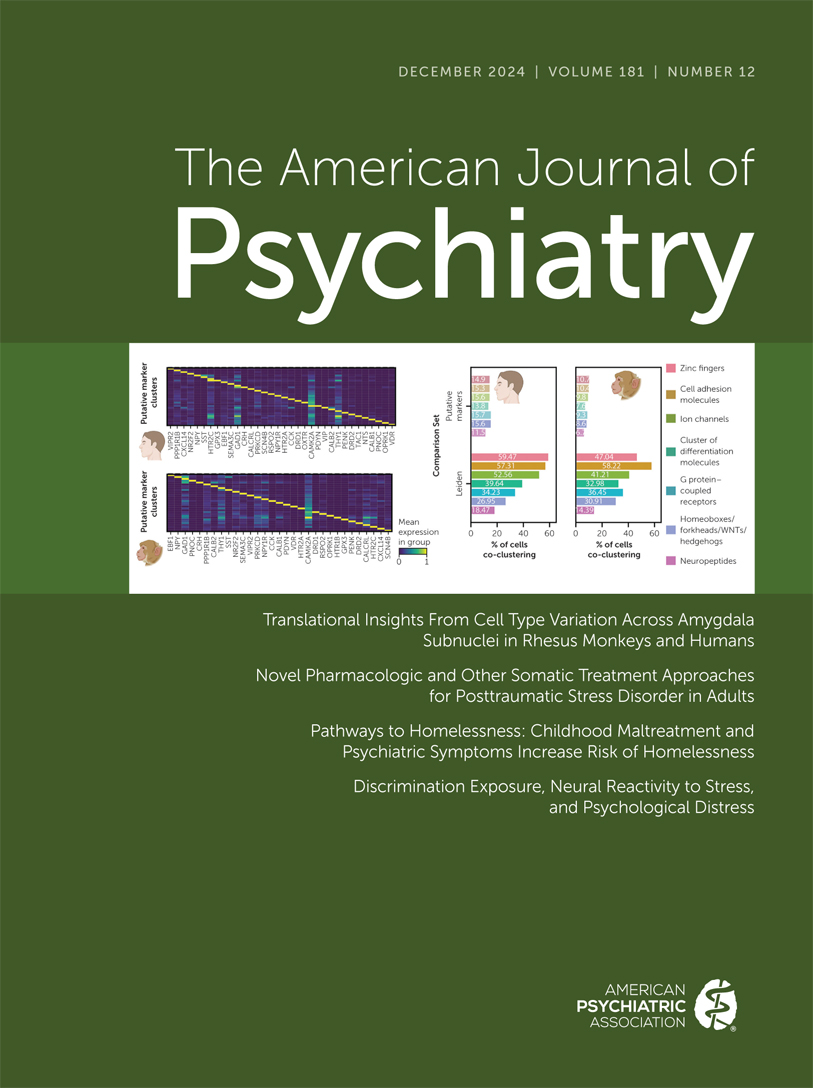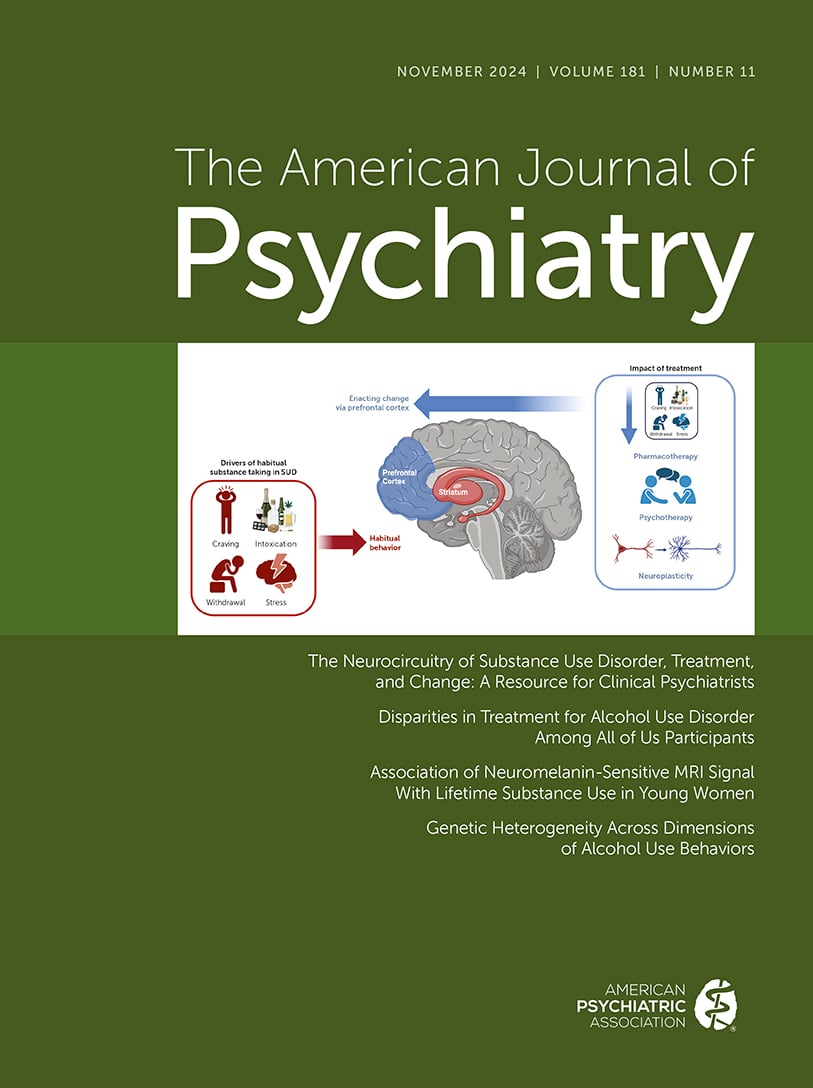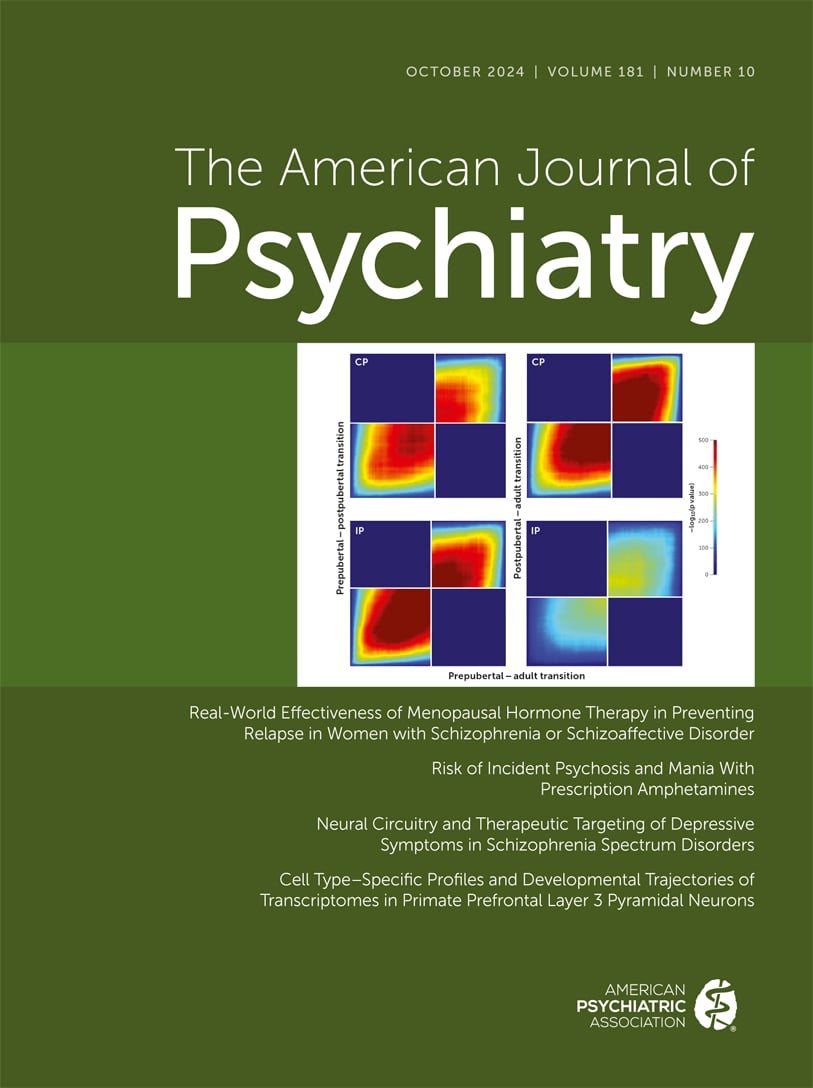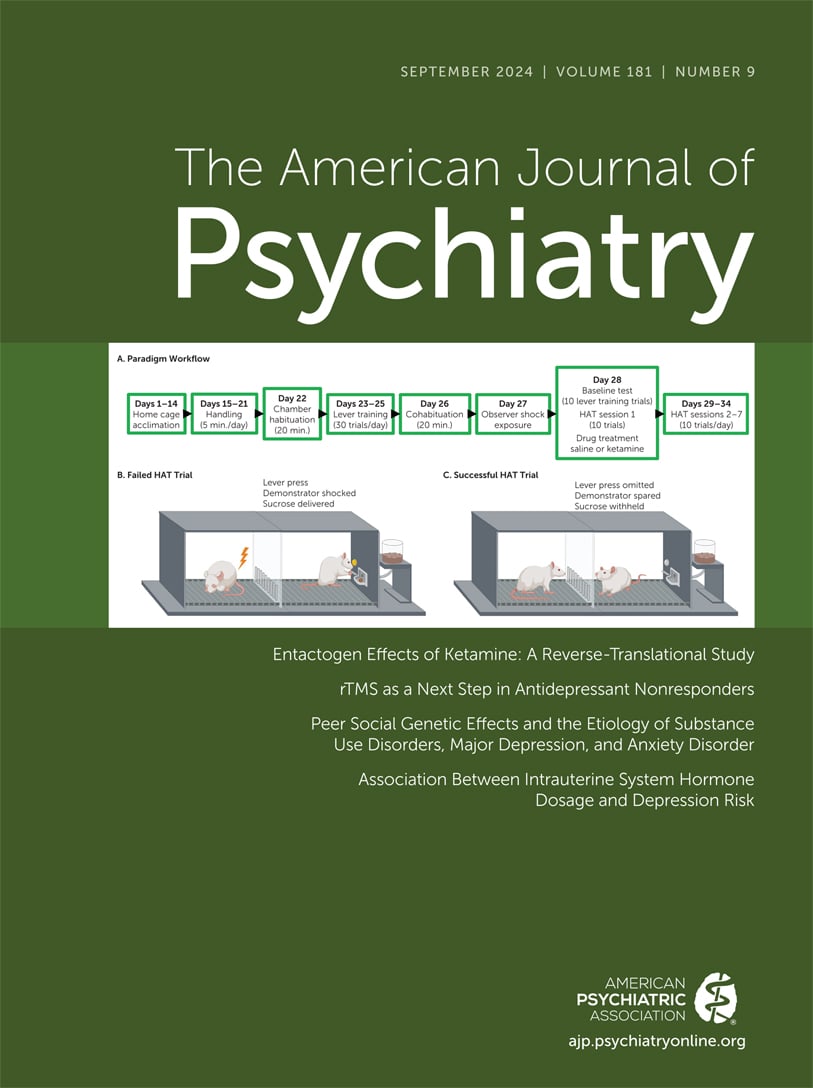American Journal of Psychiatry
- Volume 156
- Number 2
- February 1999
Editorial
Images in Neuroscience
Special Article
Publication date: 01 February 1999
Pages169–180OBJECTIVE: The author’s goal was to develop a pathophysiological model for neuroleptic malignant syndrome with greater explanatory power than the alternative hypotheses of hypothalamic dopamine antagonism (elevated set point) and direct myotoxicity (...
https://doi.org/10.1176/ajp.156.2.169Regular Article
Publication date: 01 February 1999
Pages181–189OBJECTIVE: Risk factors for suicide attempts have rarely been studied comprehensively in more than one psychiatric disorder, preventing estimation of the relative importance and the generalizability of different putative risk factors across psychiatric ...
https://doi.org/10.1176/ajp.156.2.181Publication date: 01 February 1999
Pages190–194OBJECTIVE: The authors’ goal was to determine whether suicide attempters with major depression received more intensive antidepressant treatment than depressed patients who had not attempted suicide. METHOD: One hundred eighty inpatients who met DSM-III-R ...
https://doi.org/10.1176/ajp.156.2.190Publication date: 01 February 1999
Pages195–201OBJECTIVE: There has been speculation in the literature about a link between fluoxetine use and suicidal behavior. The authors of this study hypothesized that there is no elevation in risk of suicidal behavior associated with use of fluoxetine. METHOD: ...
https://doi.org/10.1176/ajp.156.2.195Publication date: 01 February 1999
Pages202–208OBJECTIVE: The authors tested the hypothesis that nortriptyline and interpersonal psychotherapy, alone and in combination, are superior to placebo in achieving remission of bereavement-related major depressive episodes. METHOD: Eighty subjects, aged 50 ...
https://doi.org/10.1176/ajp.156.2.202Publication date: 01 February 1999
Pages209–215OBJECTIVE: The authors investigated, by whole brain functional magnetic resonance imaging (MRI), the neural substrate underlying processing of emotion-related meanings. METHOD: Six healthy subjects underwent functional MRI while viewing 1) alternating ...
https://doi.org/10.1176/ajp.156.2.209Publication date: 01 February 1999
Pages216–222OBJECTIVE: Everyday experience suggests that highly emotional events are often the most memorable. Experimental work in animals and humans has demonstrated that the amygdaloid complex plays a crucial role in emotional memory, i.e., memory of events ...
https://doi.org/10.1176/ajp.156.2.216Publication date: 01 February 1999
Pages223–228OBJECTIVE: Caffeine is by far the most commonly consumed psychoactive substance. The use and abuse of most other licit and illicit psychoactive drugs have been shown to be substantially heritable. However, the impact of genetic factors on caffeine ...
https://doi.org/10.1176/ajp.156.2.223Publication date: 01 February 1999
Pages229–237OBJECTIVE: Since there is limited information concerning caffeine’s metabolic effects on the human brain, the authors applied a rapid proton echo-planar spectroscopic imaging technique to dynamically measure regional brain metabolic responses to caffeine ...
https://doi.org/10.1176/ajp.156.2.229Publication date: 01 February 1999
Pages238–245OBJECTIVE: Previous human postmortem experiments have shown an abnormally high number of dopamine uptake sites in the striatum of chronic cocaine users, which might contribute to cocaine withdrawal symptoms such as depression and suicidality. Previous ...
https://doi.org/10.1176/ajp.156.2.238Publication date: 01 February 1999
Pages246–251OBJECTIVE: In attempting to explain the familial predisposition to panic disorder, most studies have focused on the heritability of physiologic characteristics (e.g., CO2 sensitivity). A heretofore unexplored possibility is that a psychological ...
https://doi.org/10.1176/ajp.156.2.246Publication date: 01 February 1999
Pages252–257OBJECTIVE: This study sought to describe brain regions associated with the personality dimension of introversion/extraversion. METHOD: Measures of cerebral blood flow (CBF) were obtained from 18 healthy subjects by means of [15O]H2O positron emission ...
https://doi.org/10.1176/ajp.156.2.252Publication date: 01 February 1999
Pages258–272OBJECTIVE: Personality pathology is difficult to measure. Current instruments have problems with validity and rely on a direct-question format that may be inappropriate for the assessment of personality. In addition, they are designed specifically to ...
https://doi.org/10.1176/ajp.156.2.258Publication date: 01 February 1999
Pages273–285OBJECTIVE: The DSM-IV classification of personality disorders has not proven satisfying to either researchers or clinicians. Incremental changes to categories and criteria using structured interviews may no longer be useful in attempting to refine axis ...
https://doi.org/10.1176/ajp.156.2.273Publication date: 01 February 1999
Pages286–293OBJECTIVE: Dopamine D2 receptor occupancy measurements provide a valid predictor of antipsychotic response, extrapyramidal side effects, and elevation of prolactin levels. The new antipsychotics clozapine, risperidone, and olanzapine obtain antipsychotic ...
https://doi.org/10.1176/ajp.156.2.286Publication date: 01 February 1999
Pages294–298OBJECTIVE: Clozapine and risperidone were the first two “second-generation” antipsychotic drugs approved for schizophrenia. There is currently little information about their comparative efficacy from head-to-head clinical trials. The purpose of this study ...
https://doi.org/10.1176/ajp.156.2.294Publication date: 01 February 1999
Pages299–303OBJECTIVE: Therapeutic intervention at the earliest phase of symptom exacerbation in schizophrenia is an important clinical need, but specific pharmacotherapeutic interventions for this phase of illness have not been established. This study examined ...
https://doi.org/10.1176/ajp.156.2.299Clinical Case Conference
Images in Psychiatry
Brief Report
Publication date: 01 February 1999
Pages309–311OBJECTIVE: The authors studied the risk of tardive dyskinesia for older patients in the early stages of treatment with typical neuroleptics. METHOD: They examined the cumulative incidence of tardive dyskinesia 1, 3, 6, 9, and 12 months after the ...
https://doi.org/10.1176/ajp.156.2.309Publication date: 01 February 1999
Pages312–314OBJECTIVE: Leptin is produced by fat cells and is presumed to signal the size of the adipose tissue to the brain. The authors investigated whether antipsychotic drugs that often induce weight gain affect circulating levels of leptin. METHOD: Weight, body ...
https://doi.org/10.1176/ajp.156.2.312Publication date: 01 February 1999
Pages315–316OBJECTIVE: The rate of depressive symptoms early in the course of schizophrenia was determined. METHOD: Seventy subjects with recent-onset schizophrenia were followed for 5 years by using semistructured interview instruments. The initial assessment ...
https://doi.org/10.1176/ajp.156.2.315Publication date: 01 February 1999
Pages317–320OBJECTIVE: Monoclonal antibody D8/17 identifies a B lymphocyte antigen with expanded expression in rheumatic fever, Sydenham’s chorea, and subgroups of obsessive-compulsive disorder and Tourette’s syndrome with repetitive behaviors. The authors examined ...
https://doi.org/10.1176/ajp.156.2.317Publication date: 01 February 1999
Pages321–323OBJECTIVE: The authors assessed the opinions of American psychiatrists regarding the diagnostic status and scientific validity of the DSM-IV categories of dissociative amnesia and dissociative identity disorder. METHOD: A one-page questionnaire was mailed ...
https://doi.org/10.1176/ajp.156.2.321Publication date: 01 February 1999
Pages324–326OBJECTIVE: Managed care organizations prefer putatively less expensive split treatment, i.e., a psychopharmacologist plus a non-M.D. psychotherapist. In this study the cost of integrated care by a psychiatrist was compared with split care. METHOD: Using ...
https://doi.org/10.1176/ajp.156.2.324Book Forum: WHO WE ARE AND WHAT WE DO
Book Forum: PSYCHODYNAMICS AND PSYCHOTHERAPY
Book Forum: SOMATIC THERAPIES
Book Forum: INTERNATIONAL PERSPECTIVES
Letter to the Editor
Past Issues
View Issues Archive
Vol. 181 | No. 12

Vol. 181 | No. 11

Vol. 181 | No. 10
